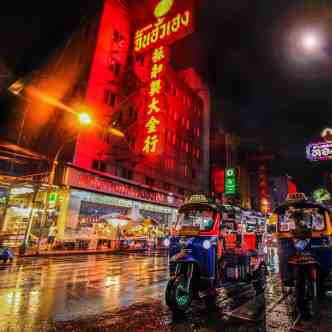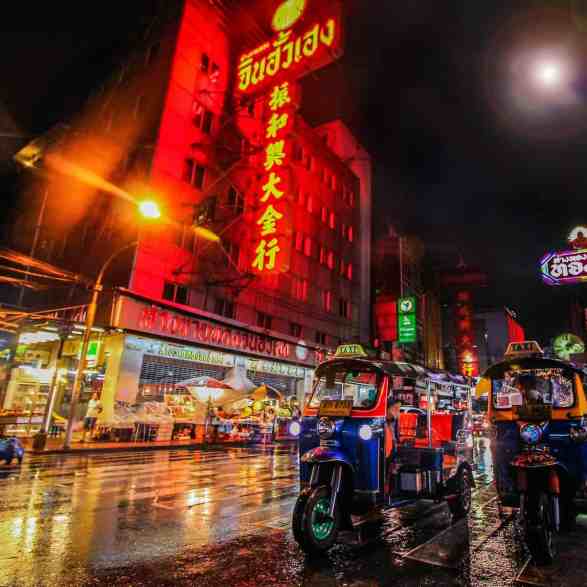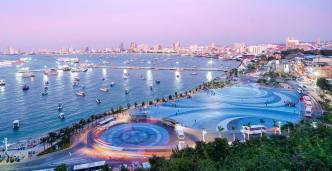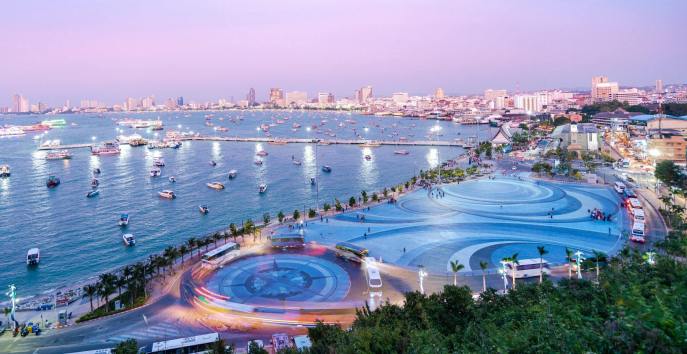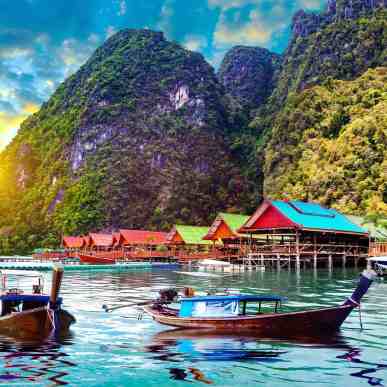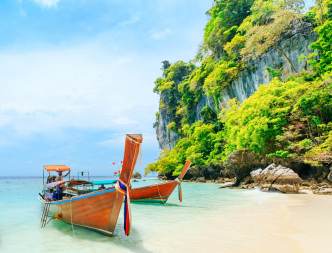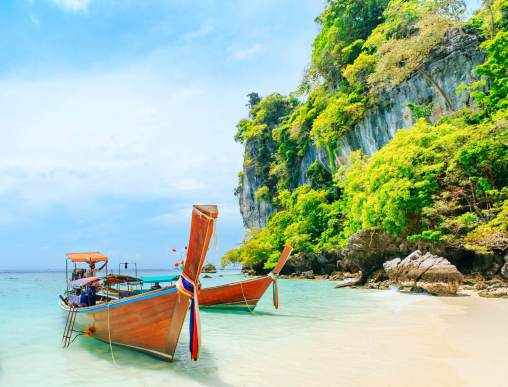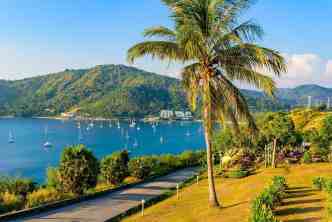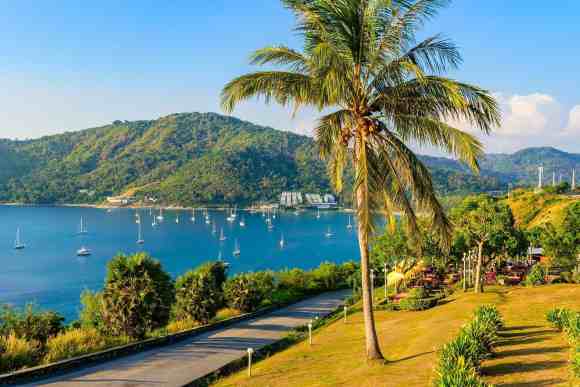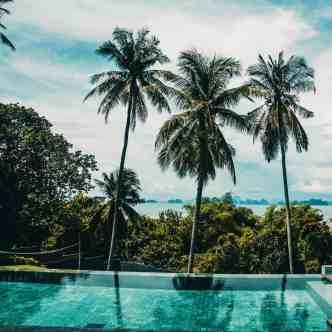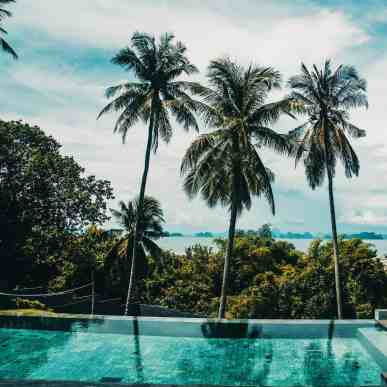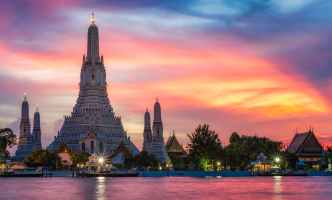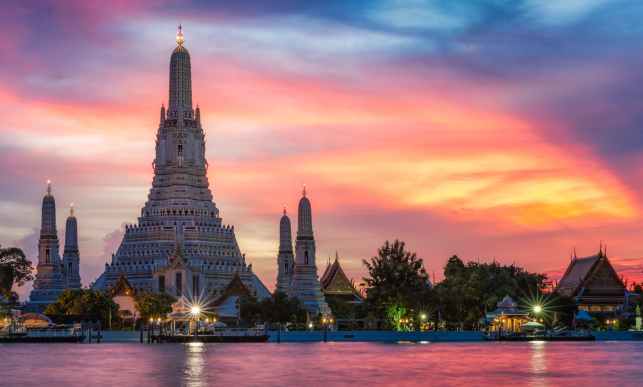Are you considering a move to Thailand? If so, you likely have many questions about what life would be like in this beautiful and exotic country.
This guide is written by Stefano Gonella, an experienced expat, relocation consultant, and property contractor who has lived in Thailand for several years and has helped dozens of expats move to this beautiful country.
This guide discusses some of the most common issues people face when relocating to Thailand. From the cost of living to cultural differences, our guide will provide insight and advice to help you decide whether Thailand is the right place for you.
In this guide:
- The legalities of moving to Thailand: visas and residency options.
- General information: climate varieties and safety.
- The cost of living: monthly expenses, rentals, and real estate.
- Thailand as a retirement destination.
- Buying real estate.
- Healthcare and education.
- Transportation options.
- Where to live in Thailand – an overview of the most popular expat locations.
- Tips for moving.
Long-stay visas and residency options in Thailand
As a tourist, you’ll automatically get a 30-day visa when you enter the country. If you want to stay longer, you can extend your visa at the immigration office for an additional four weeks by paying 1,900 baht. After that, you have to leave and re-enter the country. You can do so two times.
Ideally, it’s better to apply for a non-immigrant visa long-stay visa. For example, you could get a 1-year education visa by enrolling in a language or Thai boxing school. Or, you could get a business visa if a Thai company hires you.
There are options for retirees, investors, and wealthy expats too.
If you’re interested in a long-stay visa, it’s always a good idea to work with a local lawyer to ensure you have all the necessary documents. That way, you can avoid getting bogged down in paperwork and get back to enjoying everything that Thailand has to offer.
Here is a list of long-stay visas available in Thailand:
- Non-Immigrant O Visa: This visa is suitable for individuals who want to stay in Thailand to be with their Thai family (marriage, parents, or children).
- Non-Immigrant OA Visa: Designed for individuals aged 50 years or older, this visa is for retirees who wish to live in Thailand for an extended period.
- Non-Immigrant ED Visa: This visa is for students who wish to study in Thailand at a recognized educational institution.
- Non-Immigrant B Visa: This visa is intended for foreigners who are employed or conducting business activities in Thailand.
- Non-Immigrant O-X Visa: Introduced in 2019, this visa is for individuals aged 50 years or older who wish to retire in Thailand. It offers an extended length of stay and various benefits.
- Elite Visa: The Elite Visa is a special multiple-entry visa designed for individuals who wish to stay in Thailand for an extended period for leisure, business, or retirement. It comes with various privileges and services.
Please note that the requirements and conditions may vary for each visa. You can find more information on all the visa types above in our Thailand Visa And Residency Options guide.
Climate and weather
Thailand has a tropical climate, which means it’s warm and humid pretty much all year round. There are three main seasons to keep in mind.
First up, we’ve got the hot season from March to May. During this time, temperatures can soar up to 35°C (95°F) – yikes! But it’s also the driest season, so you won’t have to worry about getting caught in the rain.
Next, we’ve got the rainy season, which runs from June to October. You guessed it – there’s a lot of rain during this time, so be prepared for some heavy downpours and occasional flooding. The southern and eastern regions tend to get hit the hardest.
Finally, there’s the cool season from November to February. This is the best time because temperatures are a bit cooler, ranging from 20-30°C (68-86°F).
The north can get pretty chilly at night; you might need a jumper.
Keep in mind that Thailand’s climate can vary depending on where you are in the country. The north is drier and cooler, while the South is more humid and tropical.
The east coast gets more rain than the west coast, and the Central region experiences a mix of all three seasons.
Here’s how climate varies in different provinces:
| Province | Climate |
|---|---|
| Bangkok | Hot and humid throughout the year |
| Chiang Mai | Hot and dry summers, mild and cool winters |
| Phuket | Tropical climate with high humidity |
| Pattaya | Hot and humid with occasional rainfall |
| Krabi | Warm and humid, with monsoon rains |
| Ayutthaya | Hot and humid, with periodic rain |
| Phitsanulok | Hot and humid, with significant rainfall |
| Samut Prakan | Hot and humid, with occasional showers |
| Nakhon Ratchasima | Hot and dry, with a monsoon season |
| Udon Thani | Hot and dry with high temperatures |
| Surat Thani | Hot and humid, with heavy rainfall |
| Rayong | Hot and humid, with occasional showers |
Please note that these climate descriptions are general and may vary within each province.
Safety
Thailand is generally considered a safe country for both locals and expats. However, as with any destination, it is important to exercise caution and be aware of your surroundings. Here are some key points regarding safety and security in Thailand:
General safety: Thailand has a relatively low crime rate, but petty crimes like pickpocketing and bag snatching can occur in crowded tourist areas. Keep your valuables secure, be vigilant in crowded places, and avoid displaying wealth or expensive items.
Scams and tourist-targeted fraud: Like many popular tourist destinations, Thailand has instances of scams and fraudulent activities targeting tourists. Be cautious of tuk-tuk drivers, unofficial tour operators, and individuals offering overly good deals. Use reputable transportation services, book tours through trusted agencies, and be cautious with personal and financial information.
Natural disasters: Thailand is prone to natural disasters such as tropical storms, floods, and earthquakes. Stay informed about weather conditions, follow instructions from local authorities, and take necessary precautions during such events.
Traffic safety: Thailand’s roads can be busy and chaotic, particularly in urban areas. Exercise caution when crossing roads and be mindful of traffic rules. Motorbike accidents are common, so if you choose to ride a motorbike or scooter, wear a helmet, have appropriate insurance coverage, and adhere to traffic regulations.
Emergency services: Thailand has emergency services like police (191), ambulance (1669), and tourist police (1155). Save these numbers in your phone and use them if you encounter an emergency.
The cost of living
Thailand is a very affordable country. Its affordability is one of the reasons the country is so popular with expats.
Here’s how Thailand’s cost of living compares with some Northern European and North American countries:
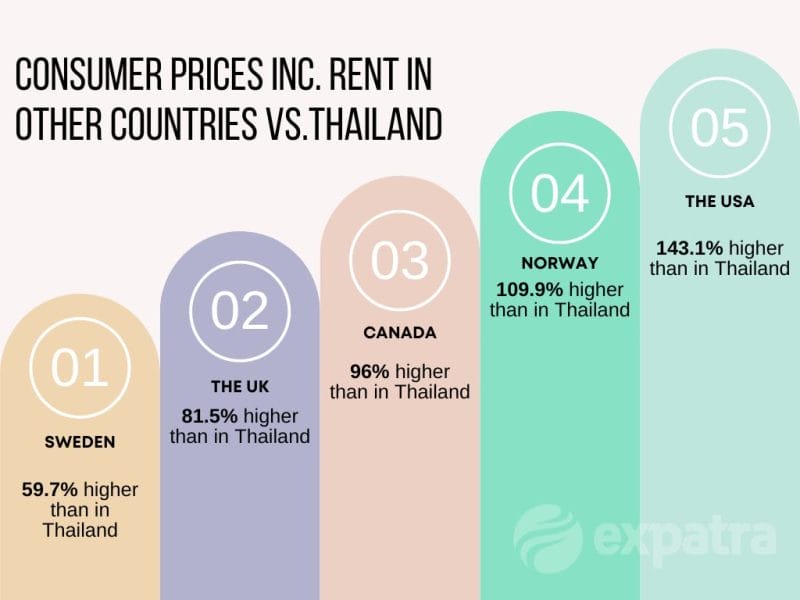
The cost of living varies depending on the location within the country.
Most expensive:
- Bangkok: The capital city is known for its bustling lifestyle and higher cost of living compared to other parts of the country. Rent, dining, and entertainment expenses tend to be higher in central areas like Sukhumvit and Silom.
Medium cost of living:
- Chiang Mai: Located in northern Thailand, Chiang Mai offers a balance between affordability and quality of life. Rent and daily expenses are generally cheaper than in Bangkok while still providing a range of amenities and a vibrant expat community.
- Phuket: Being a popular tourist destination, the cost of living in Phuket varies depending on the area. While beachfront areas and tourist hotspots can be pricey, there are also more affordable residential areas on the island.
- Krabi: Another coastal province, Krabi offers a mix of budget-friendly and higher-end options. Living costs are generally more affordable compared to Phuket.
Cheapest:
- Pai: A small town in the mountains of northern Thailand, Pai is a favorite among backpackers and digital nomads. Accommodation, food, and transportation tend to be very affordable, although available amenities may be more limited than in larger cities.
- Chiang Rai: With its tranquil atmosphere and cultural attractions, Chiang Rai offers a lower cost of living compared to bigger cities. Rent and daily expenses are generally more budget-friendly, allowing for a slower-paced lifestyle.
For detailed information on the monthly costs, rents, and real estate prices, visit our guide, Cost Of Living In Thailand.
Thailand as a retirement destination
According to the Expatra Global Retirement Index, Thailand is in the top 30 best places to retire worldwide.
The index is based on the Expatra Global Retirement Survey that asks international retirees to rate their retirement destination’s infrastructure, climate, ease of settling down, value for money, friendliness, and other aspects of life in their retirement destination.
Here’s how Thailand scores:
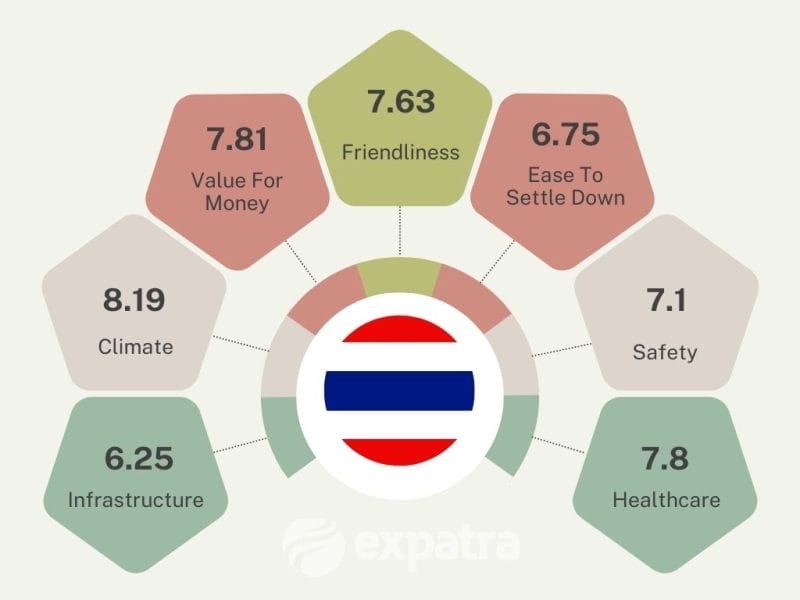
The highlights of retiring to Thailand are:
- Affordable cost of living
- Good quality healthcare
- Various residency options
- Good climate and lifestyle
- No income tax for expat retirees on a retirement visa
Things to keep in mind:
- Land ownership by foreigners is not allowed.
Buying real estate in Thailand
This is not straightforward, as foreigners cannot purchase land in Thailand and cannot own land in their own name.
If you’re a foreigner and interested in buying a property in Thailand, there are a few options available:
- Leasehold: You can lease land and buildings for up to 30 years, with the option to renew the lease for another 30 years.
- Condominiums: You can own up to 49% of the units in a condo building. This is a popular choice if you want to own a property and have the flexibility to sell it later.
- Thai Company: You can create a Thai company and buy property under its name. But this option is complicated and expensive, so it’s best to get legal advice before doing it.
Setting up a company in Thailand
Setting up your business in Thailand can be relatively straightforward, but it can also be complex and time-consuming. You need to register your business with the Department of Business Development, obtain a tax ID number, and acquire any necessary licenses and permits.
You can choose from a sole proprietorship, partnership, or limited company. Each has its own benefits and drawbacks, so pick one that suits your business.
As a foreigner, you need a Non-Immigrant Business Visa to start a Thai company. This visa allows you to stay in Thailand for up to 90 days and can be extended for a year.
Getting a Non-Immigrant Business Visa can have some great benefits. It will give you legal status to conduct business in Thailand, so you can rest assured that everything is above board.
Once your company is set up, you can apply for a work permit, which allows you to work legally in Thailand. That means you can focus on building your business without worrying about legal issues.
With this visa, you’ll be able to access Thai banking services. This is a big help when it comes to managing your business transactions.
Just remember that it’s always a good idea to get legal advice before setting up your company to ensure you’re following all the regulations and avoiding any potential complications.
Buying a property off-plan
Buying an off-plan villa has its benefits. You get more say in the design and layout of your property, which means you can work with the developer or builder to create a property that suits your needs and preferences.
By buying off-plan, you can choose the materials, finishes, and appliances that go into your kitchen, ensuring it is of high quality and up to your standards. This can be especially useful if you’re after a larger or more customized kitchen that you might not find in pre-built villas.
What’s more, buying off-plan can be a more affordable option than buying a pre-built villa. You may be able to negotiate a lower price or take advantage of early-bird discounts.
I cannot stress enough the importance of dying your due diligence when looking for a contractor or developer in Thailand.
If in doubt, you can always contact me at Krabi Contractor Co., Ltd. before buying a villa in Thailand. We can provide valuable insight and expertise to help you make an informed decision about your investment. We also have a network of contacts and resources that allows us to offer support in other locations throughout Thailand.
We have experience, local knowledge, and a commitment to quality. You can trust that your villa renovation or construction project will be completed to a high standard.
Healthcare
Health insurance in Thailand works differently for locals and expats. Thai citizens are covered by the government’s Universal Coverage Scheme (UCS), which provides basic healthcare services free of charge. Private health insurance is also available for those who want to access additional services or receive care at private hospitals.
Expats living in Thailand are not covered by the UCS and must purchase private health insurance. There are many private health insurance providers in Thailand that offer a range of coverage options, including inpatient and outpatient care, emergency treatment, and maternity care.
It is also possible to purchase health insurance from international providers that offer coverage for expats living in Thailand. International health insurance can be quite expensive. To make sure you get the best value for money, compare international health insurance options from various providers to find the best deal.
Hospitals in Thailand
You will find that Thailand’s healthcare system is quite good, with a range of hospitals and clinics catering to both locals and expats.
Here’s a list of the most prominent hospitals that expats are most likely to use:
Bumrungrad International Hospital (Bangkok): Bumrungrad is a world-renowned private hospital known for its high-quality medical services and English-speaking staff. It offers a comprehensive range of medical specialties and advanced treatments.
Samitivej Sukhumvit Hospital (Bangkok): Another top-tier private hospital, Samitivej Sukhumvit, is recognized for its excellent medical care and state-of-the-art facilities. It provides a wide range of services, including specialized medical centers and an international department.
Bangkok Hospital (Bangkok and other cities): With multiple branches across the country, Bangkok Hospital is a leading private healthcare provider in Thailand. It offers a comprehensive range of medical services, including specialized centers for various conditions.
Phuket International Hospital (Phuket): Located in one of Thailand’s popular tourist destinations, Phuket International Hospital offers a high standard of medical care. It is equipped with modern facilities and has a team of well-trained medical professionals.
Chiang Mai Ram Hospital (Chiang Mai): Chiang Mai Ram Hospital is a well-regarded private hospital in northern Thailand. It provides a wide range of medical services, including specialized centers for cardiology, orthopedics, and more.
Schools and education
You can either opt for a local public school or a private international school. However, local Thai schools teach in Thai and are only free for Thai citizens, so expat families mostly prefer private and international schools.
Note: unlike intrenational schools that follow international curricula, such as the International Baccalaureate (IB) or the curriculum of a specific foreign country (American, English, German, French, etc.)
Private schools in Thailand often follow Thai curriculum. Some can have a strong emphasis on foreign languages (English, German, french, etc.), some can be bilingual, some schools give significant preference to Thai. It is important to research your options well in advance of your move.
Some of the options available in the most popular expat destinations include:
| Locations | Schools |
|---|---|
| Bangkok | There are over 90 private and international schools in Bangkok, including: Bangkok Patana School, NIST International School, Bangkok Christian International School, St. Andrews, Crescent International School, NIST International School, RC International School, RBIS International School Bangkok. |
| Chiang Mai | Prem Tinsulanonda International School, Grace International School, Chiang Mai International, Singapore International School Chiangmai (SISB Chiangmai), Americana Chinese International School – ACIS, Unity Concord International School |
| Phuket | British International School Phuket, Headstart Phuket, Kajonkiet International School |
| Pattaya | Regent’s International School Pattaya, Tara Pattana International School, Montessori Centre |
| Samui | International School Samui, PBISS the British International School of Samui |
| Hua Hin | Hua Hin International School, Beaconhouse Yamsaard, The British Educational Children’s Center (BECC) |
| Krabi | Krabi International School, Krabi International Montessori Academy, Krabi Demonstration School |
Transportation options
Transportation options and availability may differ depending on the region and city you are in.
For example, Bangkok has an extensive public transportation system, including an elevated train (BTS Skytrain) and an underground train (MRT). In contrast, some rural areas may have limited public transportation options, and motorbikes or private vehicles may be more commonly used.
Thailand has an extensive network of public buses that connect cities and towns across the country. They are a cost-effective mode of transportation, but schedules and comfort levels can vary.
Thailand’s State Railway operates a rail network that covers major cities and popular tourist destinations. Trains offer a comfortable and scenic way to travel, with different classes available.
Metered taxis are available in cities like Bangkok and can be hailed on the street or booked through ride-hailing apps. They offer convenience and comfort, but fares can vary depending on traffic conditions.
Another option is tuk-tuks. These iconic three-wheeled vehicles are popular for short trips within cities. While they are a unique experience, fares are typically negotiated and can be higher than other modes of transportation.
In congested urban areas, motorbike taxis are a common mode of transport for short distances. They can weave through traffic, but safety precautions should be taken.
Renting a car is a popular option for exploring Thailand, especially in less urbanized areas.
There are also several domestic airports, with airlines like Thai Airways, AirAsia, and Bangkok Airways offering domestic flights to various destinations.
Driving in Thailand
Thailand recognizes valid IDLs issued by foreign countries as long as they are written in English or accompanied by an official translation. The IDL must be valid and not expired.
The IDL allows foreigners to drive in Thailand for a maximum period of 90 days from the date of entry into the country. After this period, you are required to obtain a Thai driver’s license if you wish to continue driving legally.
An IDL in Thailand permits you to drive the same types of vehicles that are covered by your original driver’s license from your home country. For example, if your original license allows you to drive cars and motorcycles, your IDL will also allow you to drive cars and motorcycles in Thailand.
When driving in Thailand with an IDL, it is essential to carry your original IDL, your original passport, and any other identification documents that authorities may request.
Where to live in Thailand
The most popular places in Thailand are Bangkok, Chiang Mai, Pattaya, Hua Hin, and others. There are quite a lot of expats living In Koh Samui, as the island is getting more and more popular.
For a quiet life, consider living In Krabi.
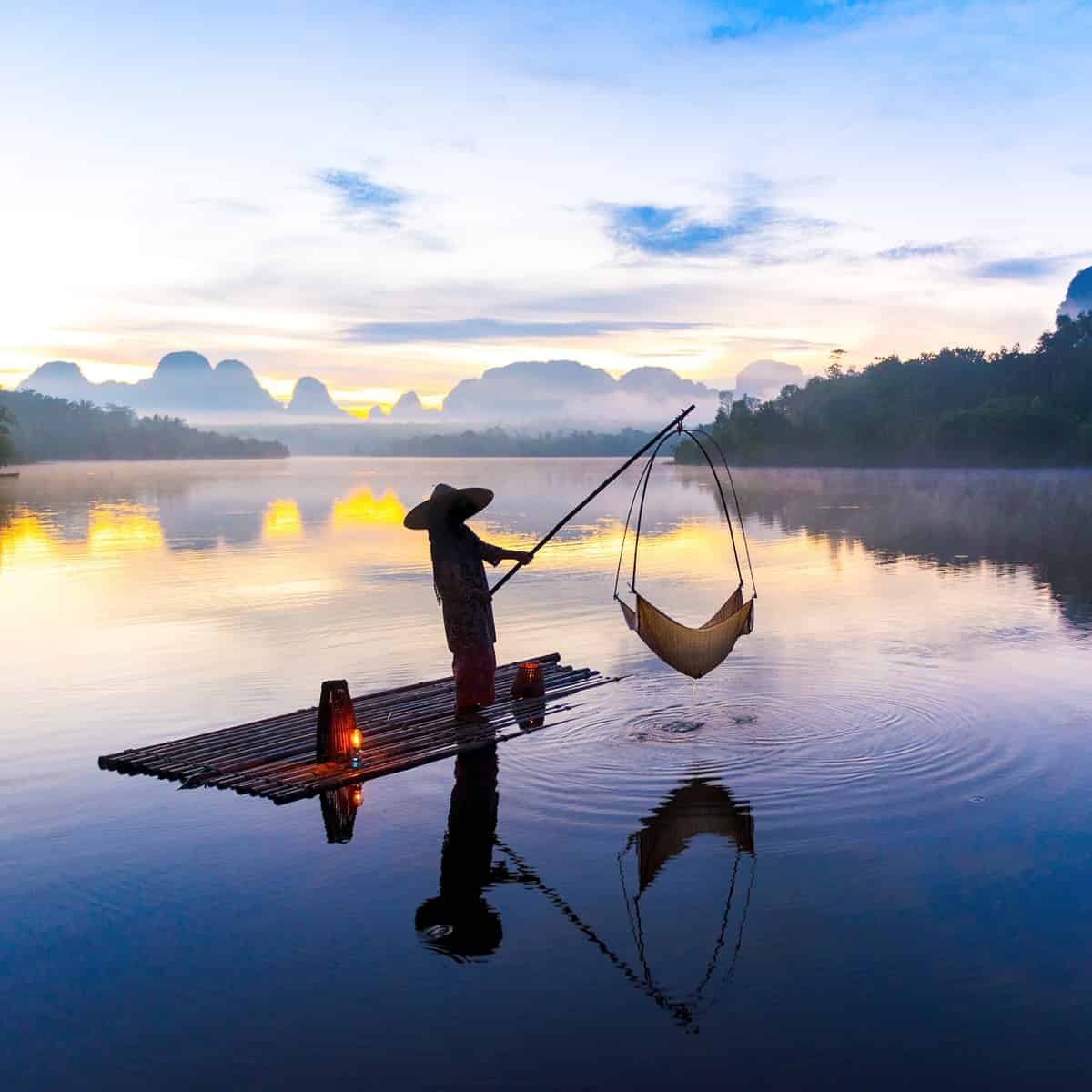
The following locations are popular with digital nmad, retirees and expat families for great amenities
Chiang Mai
Known as the “Rose of the North”, Chiang Mai offers a combination of affordable living, a pleasant climate, and a rich cultural heritage.
The city’s low cost of living, excellent healthcare and educational facilities, great infrastructure, and big expat community make it an attractive choice for retirees, families, and digital nomads.
Hua Hin
Located on the Gulf of Thailand, Hua Hin is a seaside resort town known for its beautiful beaches and relaxed vibe.
The town offers a range of amenities, including top-notch healthcare facilities and international schools, golf courses, and various restaurants. It’s a popular choice among retirees and families looking for a peaceful coastal lifestyle.
Bangkok
As the capital city of Thailand, Bangkok provides expats with a diverse range of attractions and amenities. The city offers excellent connectivity, modern infrastructure, world-class shopping centers, and a vibrant cultural scene.
Bangkok’s extensive public transportation network makes it easy to explore the city. It’s a top location for digital nomads and entrepreneurs.
Find more information in our guide, Best Areas To Live In Bangkok
Phuket
Renowned for its stunning beaches and crystal-clear waters, Phuket is a tropical paradise that attracts many retirees. The island offers a laid-back lifestyle, numerous recreational activities, and a well-established expat community. Additionally, Phuket has a range of healthcare options to cater to retirees’ needs.
Pattaya
Located on Thailand’s eastern coast, Pattaya is known for its vibrant nightlife, beautiful beaches, and bustling expat community.
The city offers a wide range of leisure activities, including golf courses, water sports, and shopping centers. Retirees, families, and digital nomads can enjoy a comfortable lifestyle in this lively city.
Our guide to the best places to live in Thailand is a perfect place to start looking for your ideal destination.
If you are planning to retire, check our guide on retirement hotspots in Thailand for expats.
Expats in Thailand
Thailand is home to a thriving expat community. Many foreigners choose to live in Thailand either full-time or part-time.
Retirees, in particular, love Thailand for its warm climate and low cost of living. Who wouldn’t want to enjoy sunny days and affordable prices, right? Check our guide on the cost of living in Thailand to see how inexpensive the country is.
Families also choose to live in Thailand, as there are many international schools and family-friendly areas.
Thailand has become a hot spot for digital nomads in recent years. Places like Chiang Mai have a growing community of remote workers who love taking advantage of Thailand’s low cost of living, fast internet, and overall comfortable lifestyle.
You can find a list of the most popular expat hotspots in our Best Places To Live In Thailand guide.
Things to know before you move
Humidity
Thailand is quite humid. It can get pretty sticky here, thanks to the humidity. If you’re someone who doesn’t handle heat well, it might be a bit of a challenge.
The humidity level varies depending on where you are in the country. The southern regions tend to be more humid, while the north tends to be drier most of the time.
If you’re living somewhere in the South, you’ll learn how to cope with the humidity. For example, you might learn tricks like storing your clothes in a wardrobe without doors or using an AC or dehumidifier to keep your room feeling fresh and dry.
Plus, as a property contractor, I can assure you that well-built properties are designed in a way that takes advantage of natural airflow. This can help keep the inside of the house ventilated and prevent mold from growing.
Even if the humidity takes some getting used to, there are ways to make it work for you. Also, remember that the high humidity can actually be great for your skin. It helps keep it soft and hydrated.
Mosquitoes
Thailand is home to many insects and mosquitoes, but they’re not usually very aggressive. You do get bitten more if you venture into the jungle during the rainy season or at sunrise and sunset when mosquitoes are especially active, but otherwise, you should be okay.
To avoid getting bitten, wearing long trousers instead of shorts or a skirt is a good idea. Mosquitoes are also said to be more attracted to dark colors, so wearing lighter clothing can help. If you have air-conditioning, that can also help keep the mosquitoes out of your home since they don’t like the cooler temperatures.
Mosquito nets and repellents are also a great way to keep the bugs at bay.
There are some cases of dengue fever, but they’re limited to certain areas and are most common during the rainy season. Even if you do catch it, it’s like a strong flu and can usually be treated within a week.
So, while bugs and mosquitoes might be a part of life in Thailand, they’re not usually a major problem as long as you take some simple precautions.
Tap water
Generally, I would not recommend drinking tap water in Thailand as it may not be safe due to the possibility of bacteria, viruses, and pollutants. So, it’s best to play it safe and opt for bottled water instead. It’s really cheap, and you can find it at most convenience stores, supermarkets, and street vendors.
Another thing to keep in mind is the ice in drinks, as it may be made from tap water. When you’re out and about, it’s always a good idea to ask if the ice is made from purified water or skip it altogether to be on the safe side.
Living in Thailand without speaking Thai
It is totally possible to live in Thailand without knowing Thai, especially if you plan to stay in tourist areas or expat communities where many locals speak English.
However, learning some basic Thai phrases can be very helpful in daily life, especially if you venture outside tourist areas or interact with locals in markets, shops, or restaurants.
Also, learning the Thai language can help you better understand and appreciate the local culture and make it easier to navigate daily life in Thailand.
The burning season in Thailand
Burning season in Thailand can be quite bad, especially in the northern regions of the country. Farmers burn their fields to clear out the old crops and prepare the land for new ones. I
t typically occurs between February and April, and during this time, the air quality can be very poor. Some expats in the northern areas, especially in Chiang Mai, go traveling during this time to avoid pollution.
You might find helpful:
Didn’t find what you were looking for? Comment with your question, and we will do our best to help.
If you need assistance with your relocation, Stefano is a Hexedes relocation advisor and provides full relocation services to Thailand. Contact us, and we will put you in touch with Stefano.
Helpful external links:
- Thailand travel information – tourismthailand.org
- Thailand electronic visa – Thai visa.go.th

